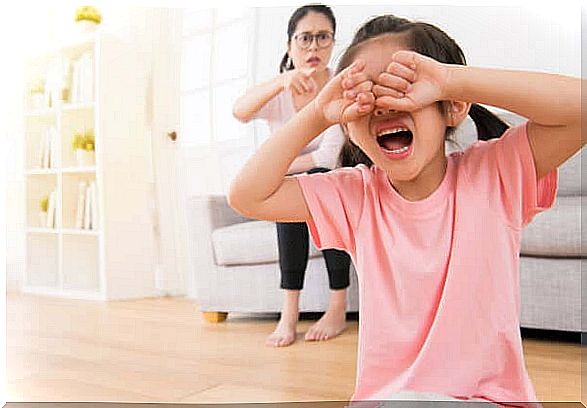How To Help A Child Cope With The Death Of A Loved One
Although death is a natural part of life, when it touches a loved one, it upsets us. We need to help children cope with death and express the pain they feel.

Death is part of life. When a loved one dies, it upsets all of us who love it. Helping a child cope with death can be difficult because they don’t understand the meaning of loss and need us to understand that they need to express their feelings without fear.
The notion of “death” depends on the age
Children’s understanding of the meaning of death will depend on their age. From birth until the age of 2 years, the child perceives only the absence of the deceased person. From the age of 3, children may believe that death is temporary and reversible. Between 5 and 6 years old, they can already understand that it is final, they assimilate the differences between life and death.
They know that people die, but it is only at the age of 8 or 9 that they are able to understand that they too can die. After the age of 10, they already understand the meaning of death in its entirety.
Children’s reactions to the death of a loved one
A child’s reaction to the death of a loved one will adapt to what he sees in the rest of his family. In families who speak openly about the issue, the child will have the opportunity to express their grief and sadness. For families who find it taboo to talk about death, it will be more difficult for children to cope because they will not know how to express their feelings.
Some children may express their pain silently and others will do so by expressing their sadness. Others, on the other hand, may behave in an uncontrollable and defiant manner. There can also be a chaos of regression, anxiety, anger and depression. It will also depend on the bond that binds them to the deceased family member.
Depending on the age of the child, reactions to death can also occur at school. Problems such as lack of attention and concentration, memory difficulties (forgetfulness becomes frequent) and academic performance may decrease.
Measures to help children cope with the death of a loved one
Just as a child’s age affects how they cope with death, it’s also important to know how close the parent was. The death of a grandfather, grandmother, uncle or cousin will not be as traumatic as that of a father or brother. However, it is necessary to help them face the death, to express their pain and to initiate the grief that they must go through in order to overcome the loss of this loved one.
Communicate the news as soon as possible
There is no such thing as a great time to announce the passing of a loved one. This should be done as early as possible to help the child cope with the death of a family member. If the mother or father is deceased, it is best to notify the living parent. If you are feeling very devastated, perhaps this responsibility should be taken on by another close relative.
Helping a child cope with the death of a loved one: avoid euphemisms
Grandmother is not “gone”. Children must be made clear that death is final. Answer all of their questions as naturally and calmly as possible. Use language appropriate to the age of the child, you must make him understand.
You don’t have to give details the child doesn’t ask for. If it is an elderly person or an illness, explain to him that we are all going to die after we get older or if we get sick. If it was the result of an accident, explain that what happened affected the body of the deceased.
Allow him to express his feelings

The death of a loved one creates a great void. Where appropriate, the living parent should endeavor to meet any emotional or emotional needs of the child by receiving the news or attending the funeral. In other words, the child may need your hug to cry. Others will need to talk. They may even gamble or be hyperactive at the funeral. Let them move. They are probably draining their emotions through gambling.
Helping a child cope with the death of a loved one: avoid overprotecting them
Some adults believe that they should protect children from death. They keep them away from funerals, they don’t cry or talk about the deceased. They even make up death stories to supposedly protect children from pain.
Despite these good intentions, it does not help the children. Toddlers need to express their feelings and say how much they will miss the deceased loved one.
Express your own pain
It will do your children good to see you mourn the deaths of your loved ones. Seeing you openly expressing your grief will help your child to express his feelings about the loss of a loved one. Expressing your feelings is one way to help a child cope with the passing of a family member.
Crying teaches him that it is necessary and natural to cry when he feels so much pain for the loss of a person he loved. What you should avoid is scaring your children. Kids don’t need to see you cracking up to the point where they feel like they’ve lost you. The way you deal with your pain will help them cope with the loss.
Farewell is the key to the onset of mourning for a loved one
Whether or not the child should attend the funeral of a loved one depends on the family and the child. If the child is old enough, it is important that you explain what will happen at the funeral. Children can decide not to attend and that will be fine.
A child attending a funeral may also want to step back at some point. Respect his request, do not force him to be present. For this it is good that you have previously coordinated with someone you trust and the child, so that they can withdraw into what their desire manifests.
Either way, make sure the child says goodbye to the loved one. It can be a letter if the child does not want to attend the funeral. They can also visit the site where the body lies. Farewell is essential to initiate mourning and help the child cope with the death of a loved one, but it does not have to happen in front of the body of the deceased parent.









